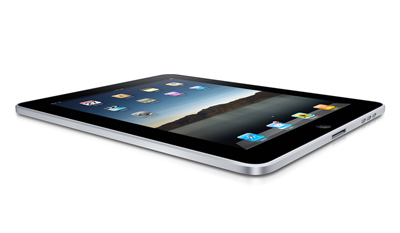iPad: Back to the future
February 2nd, 2010Apple finally introduced the iPad tablet computer last Wednesday, confirming rumors that have been circulating since before I started Newton Poetry a few years ago. From then to now, I’ve read article after article and rumor after rumor – everything from claiming this new device was the second coming of the Newton to a giant iPod Touch.
Sometimes keeping track of everything was exhausting. Even more than the iPhone, the mythical Apple tablet kept rumor sites in business for years. Then, when so many confirmations gelled together, most Apple fans knew what was coming when Steve Jobs hit the stage on January 27 in San Francisco.
Many, many tech writers invested in a lot of detective work to flesh out this device, and I think a lot of credit goes to them for softening the holy-crap blow that this device would’ve otherwise caused us to have. The iPad’s introduction was nothing like the iPhone introduction because we had all seen and heard it before. Not that there’s anything wrong with that.
Nothing remarkable, nothing earth-shattering – just steady progress, and tiny chips brushed away from the mobile sculture Apple is crafting.
This project, the giant move to mobile computing Apple has been working on since the day of the original PowerBook and Newton MessagePad, has essentially come to fruition in the form of the iPad. Jobs mentioned (and reports back him up) that Apple is primarily a mobile device company. It’s the powerful combination of a touch-based interface, a world-conquering application platform, and – most of all – the opportunity that is still to come.
That’s the key. I think the earth-shattering part will come in the form of something we haven’t even seen yet. We might even have trouble knowing it when we see it.
For some, the iPad doesn’t seem like much now. But just wait, says Steven Fry in a much-linked post:
In the future, when [the iPad] has two cameras for fully featured video conferencing, GPS and who knows what else built in (1080 HD TV reception and recording and nano projection, for example) and when the iBook store has recorded its 100 millionth download and the thousands of accessories and peripherals that have invented uses for iPad that we simply can’t now imagine – when that has happened it will all have seemed so natural and inevitable that today’s nay-sayers and sceptics will have forgotten that they ever doubted its potential.
All ready, I’m seeing fantastic ideas about what the iPad can become, given some time.
The iPad, like the original Macintosh, ships with basic task-oriented software titles, like iWork, that make it a capable machine. With the Mac, the explosion in innovation came when desktop publishers realized what a powerful machine they had sitting on their desks. With the iPad, a similar spark will happen.
The tech echo chamber is resounding this notion that the computer-as-appliance has finally arrived. The iPad is the computer your grandma can use without calling you for tech support every week. The details have been abstracted away – and use whatever car metaphor makes you comfortable here.
And that’s probably true. But something tells me the future is brighter than grandma. The iPad will gain mutant electro-superpowers after the proverbial lightning strikes.
Storms a-brewin’.





